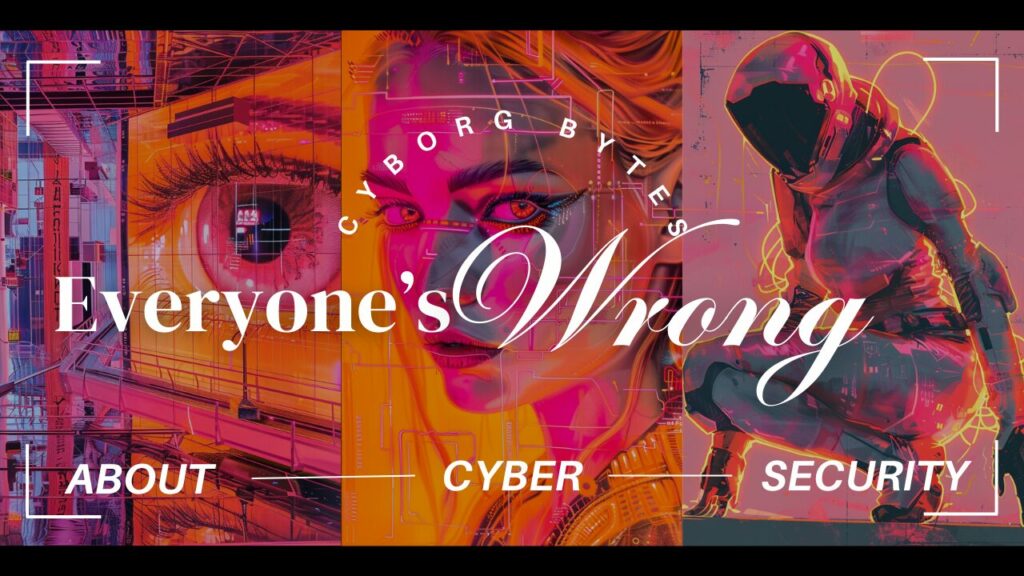Everyone, especially the experts, is wrong about cybersecurity.
This realization hit me hardest after watching ‘The Social Dilemma’ and feeling a profound sense of helplessness.
“But why, Addie? Aren’t you a cybersecurity advisor?”
Yes, I am, and that’s exactly why I was so alarmed.
Despite being deep in the gov tech industry and specializing in cybersecurity, I was completely unaware of these practices.
“The Social Dilemma” exposes several critical issues with social networking, highlighting how the creators and operators of these platforms are actively contributing to societal harm. Here’s a list of key issues it exposed:
1. Algorithm Manipulation: Social media companies design algorithms that manipulate your attention and exploit your data to maximize their profits, often harming your mental health.
2. Data Privacy Breaches: These companies harvest and sell your personal data without your explicit consent, violating your privacy for financial gain.
3. Spread of Misinformation: They allow the rapid spread of misinformation and fake news on their platforms, which can skew your perceptions and influence elections.
4. Mental Health Effects: These platforms have been engineered to addict you, contributing to increased depression, anxiety, and addiction, especially harmful to teenagers.
5. Polarization of Society: Social media deepens divisions within society by trapping you in echo chambers that amplify personal biases and restrict open dialogue.
6. Exploitation of Human Psychology: These companies use their understanding of human psychology to create features like “likes” and notifications that keep you hooked, exploiting natural human desires for social validation.
7. Impact on Children: They aggressively target children, who are especially vulnerable to the addictive and manipulative features of social media, endangering their development.
8. Lack of Accountability: Social media companies operate with a disturbing lack of accountability for how their platforms are used and the detrimental impacts they have on society.
9. Economic Consequences: Their economic model prioritizes engagement over your well-being, making decisions that benefit their bottom line at the expense of societal health.
10. Surveillance Capitalism: They commodify your human experiences, using them to train algorithms that target you more effectively, further encroaching on your privacy and autonomy.
These actions demonstrate a troubling disregard for ethical standards by those who control social media platforms, directly impacting you and the broader society negatively.
“The Social Dilemma” exposes several critical issues with social networking, highlighting how the creators and operators of these platforms are actively contributing to societal harm. Here’s a list of key issues it exposed:
1. Algorithm Manipulation: Social media companies design algorithms that manipulate your attention and exploit your data to maximize their profits, often harming your mental health.
2. Data Privacy Breaches: These companies harvest and sell your personal data without your explicit consent, violating your privacy for financial gain.
3. Spread of Misinformation: They allow the rapid spread of misinformation and fake news on their platforms, which can skew your perceptions and influence elections.
4. Mental Health Effects: These platforms have been engineered to addict you, contributing to increased depression, anxiety, and addiction, especially harmful to teenagers.
5. Polarization of Society: Social media deepens divisions within society by trapping you in echo chambers that amplify personal biases and restrict open dialogue.
6. Exploitation of Human Psychology: These companies use their understanding of human psychology to create features like “likes” and notifications that keep you hooked, exploiting natural human desires for social validation.
7. Impact on Children: They aggressively target children, who are especially vulnerable to the addictive and manipulative features of social media, endangering their development.
8. Lack of Accountability: Social media companies operate with a disturbing lack of accountability for how their platforms are used and the detrimental impacts they have on society.
9. Economic Consequences: Their economic model prioritizes engagement over your well-being, making decisions that benefit their bottom line at the expense of societal health.
10. Surveillance Capitalism: They commodify your human experiences, using them to train algorithms that target you more effectively, further encroaching on your privacy and autonomy.
These actions demonstrate a troubling disregard for ethical standards by those who control social media platforms, directly impacting you and the broader society negatively.
The movie showed the scary disturbing truths of surveillance capitalism, and I remember feeling really sick by the end.

I was shocked by the amount of privacy invasion and manipulation it showed.
It made me wonder why we don’t think of our minds as areas to protect in cyberspace.
Then it hit me—the reason is quite simple.
Businesses profit from our ignorance, and that’s why these issues are rarely addressed openly.
It mostly makes sense from their perspective, but not for the rest of us.
No one is fighting for us.
Where Do We Go From Here?
Now that I had opened Pandoras box, I couldn’t unsee the dangers lurking everywhere.
I didn’t know what to do.
But I’ve always lived by a cybersecurity motto that transcends mere frustration:
Don’t get mad, get annoying.
This is the bottom line philosophy of cybersecurity, to be as annoying and time consuming of a target as possible so attackers get bored and move on to someone easier.
Instead of getting mad or feeling hopeless, I choose to empower myself—and teach others—to use technology to fight back against this unfair manipulation.
Together, we can take control of their manipulative algorithms and use them to improve ourselves, turning challenges into opportunities for growth and strength.
I committed myself to teaching people how to protect themselves from the constant surveillance and manipulations of digital platforms.
It’s not just about personal protection; it’s about rebelling against a system that profits from our ignorance.
Many people are unaware of the vast amount of data being collected and how it is used.
Companies and governments profit from this lack of awareness, violating our rights and targeting vulnerable groups without facing any consequences.
By remaining uninformed, we unintentionally allow them to continue.
So, I’m here to pull back the curtain.
I’m here to show you how to protect yourself, to educate you on the real stakes of digital privacy, and to empower you with the knowledge and tools to reclaim control.
Let’s not just feel helpless—let’s fucking do something about it.

This article will cover my framework to help shift cybersecurity’s focus from broad corporate policies to personal empowerment tools.
You’re going to weaponize cybersecurity to fight back.
We will explore the importance of personal reputation/branding and how it intersects with digital security, master manipulating the algorithms that influence what we see and how we are seen online, develop basic hacking skills (beginner-friendly!) tailored for personal security, and finally, understand how technology can lead to self-actualization, fulfillment, and lifestyle autonomy.
We’re flipping algorithms on their heads.
The Problem with Normie Cybersec
Cybersecurity has always focused mostly about protecting big businesses and their secrets.
But what about you?
Your online life and personal data are just as valuable, yet they’re often neglected.
Every time you post, shop, or even search online, you leave behind data trails that can be exploited.

YOU are an asset, and your mind deserves appropriate protection, to a higher degree than ANY company gatekeeping does.
YOU deserve to transform technology from a tool that enslaves you into a powerful ally that gives you an advantage.
YOU are worth protecting, and it’s complete bullshit that these companies have thrown all of us to the wolves like this.
It’s time to de-prioritize enterprise cybersecurity and apply it to ourselves instead.
But how?
Cyber Freedom Framework: The Four Pilla-Rs of Holistic Cybersecurity
Welcome to a new era of cybersecurity tailored for you.
The Cyber Freedom Framework (CFF) will help you safeguard your online environment and harness technology to elevate every aspect of your life.
Mental.
Physical.
Spiritual.
Social.
I designed the it empower individuals with a comprehensive approach to cybersecurity, transforming their interaction with digital spaces from passive participation to active and informed engagement.
This framework unlocks four powerful strategies—Reputation, Resilience, Rampart, and Revolution—each crafted to manipulate technology to your will, supercharging your digital life.
It includes taking care of both your physical and emotional health.

When things like high blood pressure, addiction, and emotional reactions from online content begin to impact your physical health, it’s essential to act.
Similarly, when propaganda clouds our thoughts or when our capacity for attention and creation wanes, we need to defend our minds vigorously.
It’s shocking that traditional cybersecurity has overlooked these personal impacts, focusing too narrowly on financial gains and enterprise priorities.
Understanding that your digital presence can significantly affect your real-world experiences, this framework provides you with the tools to build and secure your dream reality.
The Four Rs of Personal Cybersecurity
- Reputation: Cultivate a personal brand that reflects your true self and aspirations. Regular audits of your digital footprint are essential to mitigate risks such as identity theft and reputation damage. A strong online persona opens doors to opportunities while protecting you against digital threats.

- Resilience: Develop critical digital literacy to navigate and counter manipulative narratives. Mastering skills like Open Source Intelligence (OSINT) and understanding algorithm manipulation will allow you to curate experiences that align with your personal values rather than consumerist agendas.

- Rampart: Strengthen your personal cybersecurity by learning how to hack and secure your networks and devices. This means transforming complex security principles into actionable knowledge, allowing even beginners to safeguard their digital spaces effectively.

- Revolution: Embrace alternative financial systems and privacy-enhancing technologies to opt-out of traditional and often oppressive economic systems. This empowerment extends to securing your digital and financial autonomy, ensuring you are not just safe but also independent.

Through the CFF, you are not merely defending against threats; you are proactively using technology to build a life that reflects your values and aspirations.
When all of these things work in harmony, we have the opportunity for the 5th R: Renaissance.
In this stage, humans can flourish by expressing themselves through art and knowledge using these tools.
You transition from consumer to creator and architect of your life and reality.
This framework turns you from a passive user into an active player in your cybersecurity, encouraging you to be well-informed and take charge of your digital life.
Implementing Personal Cybersecurity
To implement this new framework, individuals must be educated and empowered to:
- Understand the value of their online data and digital interactions.
- Learn basic cybersecurity practices that can be applied in everyday life.
- Use technology creatively to enhance their quality of life, overcoming barriers like disabilities or lack of resources.
Call to Action: A Cyber Revolution

As we peel back the layers of digital exploitation, the path forward becomes clear.
This isn’t just about safeguarding data—it’s about reclaiming our digital autonomy and using technology as a tool for personal and collective empowerment.
The Cyber Freedom Framework isn’t merely a defensive strategy; it’s a proactive blueprint for a life where technology enhances rather than exploits.
By understanding the mechanics behind digital manipulation and taking control of our online interactions, we transform from passive spectators to architects of our digital destinies.
This newsletter is your gateway to turning theoretical knowledge into practical power.
Subscribe to join a community dedicated to disrupting the status quo of surveillance capitalism.
Together, we’ll explore how to harness digital tools to fortify our personal freedoms and craft a more informed, empowered existence.
Let’s not just adapt to the digital age—let’s redefine cybersecurity.
Stay Curious,
Addie LaMarr


